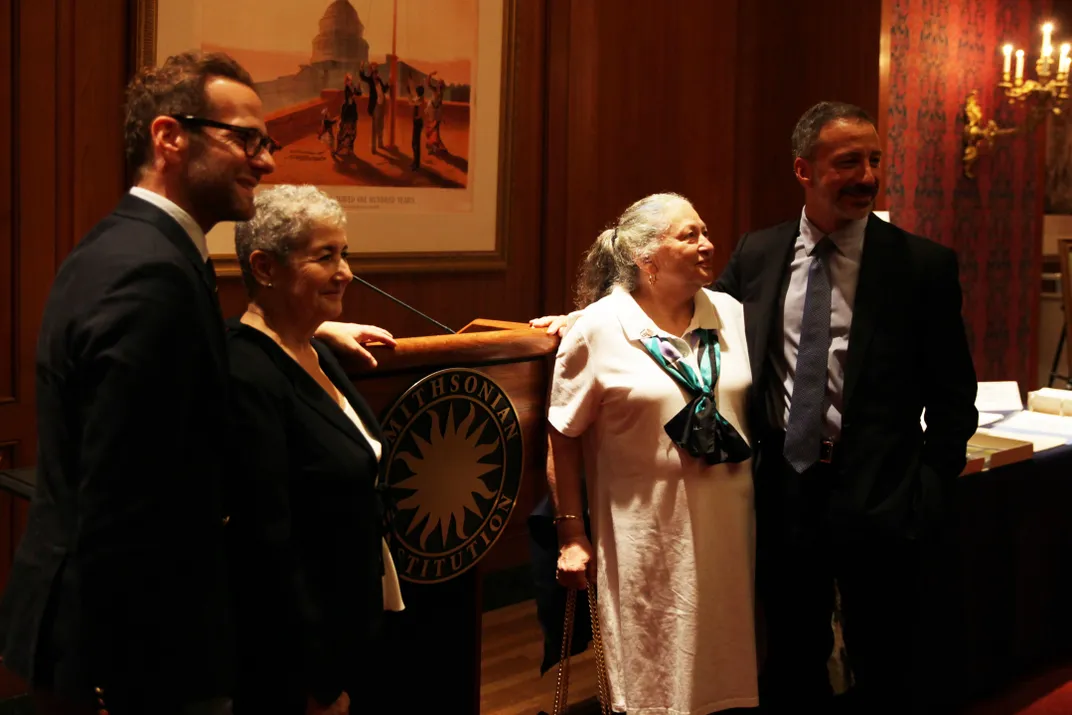A Proud Day at American History Museum as LGBT Artifacts Enter the Collections
The creators of “Will & Grace” and others donated objects related to gay history
:focal(2494x1496:2495x1497)/https://tf-cmsv2-smithsonianmag-media.s3.amazonaws.com/filer/f3/ea/f3ea1159-b9f3-45d9-85eb-d2c4d90caed3/script_copy.jpg)
When David Kohan and Max Mutchnick penned the pilot for "Will & Grace" a decade and a half ago, they had no idea the social implications the show would have. "We were hired to write a comedy for NBC and that's what we did," Mutchnick says. "That all of this happened really was a happy accident." Earlier today, Kohan and Mutchnick donated the script for that pilot and other items from their show to the National Musem of American History.

Mutchnick and Kohan decided to donate around 2012, after Joe Biden spoke to the press about the show's social and cultural impact and his support for gay marriage. The items had been at Emerson College, where Mutchnick attended college, but the school was looking to move the collection. So Mutchnick and Kohan contacted Dwight Blocker Bowers, an entertianment curator at the American History Museum, who selected artifacts from those at Emerson. "They're representative of all different things," Kohan says of the items, including "combating hatred with humor."
In attendance at today's donation ceremony were Kohan and Mutchnick's mothers. "Without them, neither of us would be gay," Kohan joked after signing the deed of gift. "Or funny."
"Will & Grace" debuted on NBC in 1998, only two weeks before Matthew Shepard was beaten for being gay and left to die in Laramie, Wyoming. By the time the show ended its run in 2006, depictions of gay characters on television had gone from fringe or exclusively comedic to mainstream. Yet Mutchnick says there is still progress to be made. "I for one would like to see some gay characters swing back to the center and get out of that role of the funny neighbor," Mutchnick says. "I would love to see a really fleshed out gay man or woman standing at the center of a show."
Kohan's sister, Jenji, is behind another popular television show that depicts gay characters, "Orange is the New Black."

Mutchnick has been a longtime fan of the American History Museum's collection, especially Dorothy's slippers from The Wizard of Oz. "It was in my paperwork when I came out of the closet," Mutchnick jokes. "Trip number one—the National Museum to check out the ruby slippers." In addition to the pilot script, Kohan and Mutchnick donated personal correspondence, props from the show, and an illustration of the main characters by famous caricaturist Al Hirschfeld.
The "Will & Grace" items were among many related to the LGBT community that entered the museum's collections today. Other artifacts included the first transgender pride flag, a tennis racket owned by transgender athlete Renée Richards, and costumes from the DC Cowboys Dance Company.
"It's non-existent," says Monica Helms, who designed the transgender pride flag in 1999, about the representatation of transgender history in most museums. "We have been marginalized. People don't realize that we've existed. We've existed all along." For the flag, Helms used the colors light blue, pink and white, symbolizing baby boys and girls and "people who are still questioning what gender they do have."

Helms wore her father's U.S. Navy baseball cap to the donation ceremony. She served in the Navy in the late 1970s and began living as a woman in 1997. Following the donation, she spoke about how the rights of transgender people serving in the U.S. military have yet to progresses like those of gay people. Currently, transgender people cannot serve openly in the military.
Also donating today was David Huebner, the first openly gay ambassador in the Obama administration. Huebner gave the diplomatic passports belonging to him and his husband. "You really are the face and the voice of the American people," Huebner says of his time as ambassador. "A lot of it is very difficult." His husband was likely the first same-sex spouse to recieve a diplomatic passport.
Previous items in the museum's collection relating to the LGBT community include protest signs from the gay civil rights movement, a tennis dress belonging to Billie Jean King, and lab equipment relating to HIV and AIDS.

/https://tf-cmsv2-smithsonianmag-media.s3.amazonaws.com/accounts/headshot/MAx2.jpg)
/https://tf-cmsv2-smithsonianmag-media.s3.amazonaws.com/accounts/headshot/MAx2.jpg)